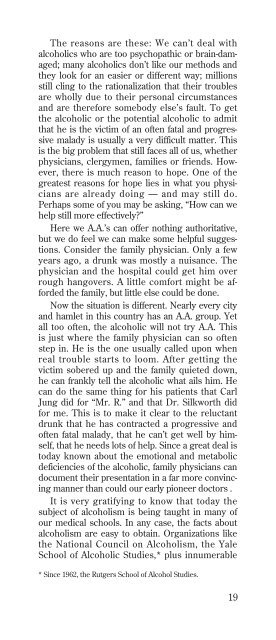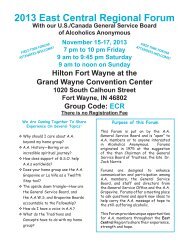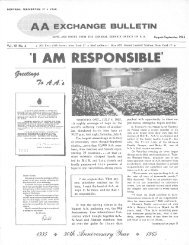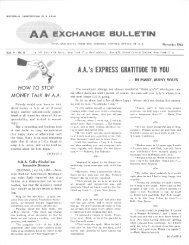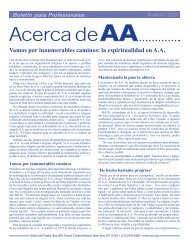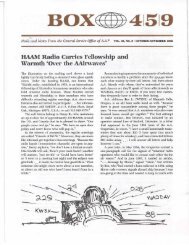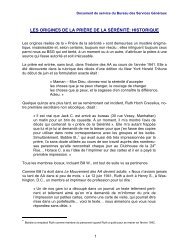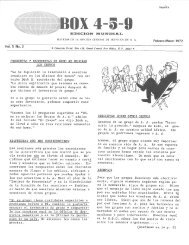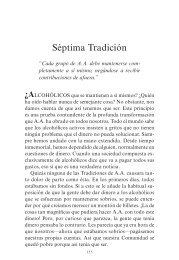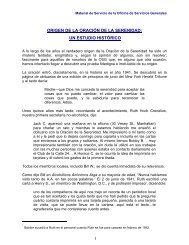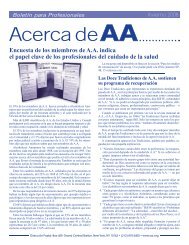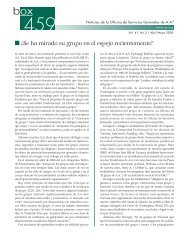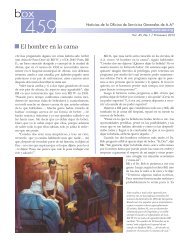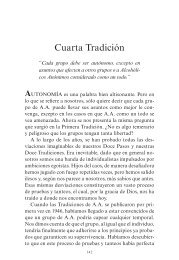Three Talks to Medical Societies by Bill W - Alcoholics Anonymous
Three Talks to Medical Societies by Bill W - Alcoholics Anonymous
Three Talks to Medical Societies by Bill W - Alcoholics Anonymous
Create successful ePaper yourself
Turn your PDF publications into a flip-book with our unique Google optimized e-Paper software.
The reasons are these: We can’t deal with<br />
alcoholics who are <strong>to</strong>o psychopathic or brain-damaged;<br />
many alcoholics don’t like our methods and<br />
they look for an easier or different way; millions<br />
still cling <strong>to</strong> the rationalization that their troubles<br />
are wholly due <strong>to</strong> their personal circumstances<br />
and are therefore somebody else’s fault. To get<br />
the alcoholic or the potential alcoholic <strong>to</strong> admit<br />
that he is the victim of an often fatal and progressive<br />
malady is usually a very difficult matter. This<br />
is the big problem that still faces all of us, whether<br />
physicians, clergymen, families or friends. However,<br />
there is much reason <strong>to</strong> hope. One of the<br />
greatest reasons for hope lies in what you physicians<br />
are already doing — and may still do.<br />
Perhaps some of you may be asking, “How can we<br />
help still more effectively?”<br />
Here we A.A.’s can offer nothing authoritative,<br />
but we do feel we can make some helpful suggestions.<br />
Consider the family physician. Only a few<br />
years ago, a drunk was mostly a nuisance. The<br />
physician and the hospital could get him over<br />
rough hangovers. A little comfort might be afforded<br />
the family, but little else could be done.<br />
Now the situation is different. Nearly every city<br />
and hamlet in this country has an A.A. group. Yet<br />
all <strong>to</strong>o often, the alcoholic will not try A.A. This<br />
is just where the family physician can so often<br />
step in. He is the one usually called upon when<br />
real trouble starts <strong>to</strong> loom. After getting the<br />
victim sobered up and the family quieted down,<br />
he can frankly tell the alcoholic what ails him. He<br />
can do the same thing for his patients that Carl<br />
Jung did for “Mr. R.” and that Dr. Silkworth did<br />
for me. This is <strong>to</strong> make it clear <strong>to</strong> the reluctant<br />
drunk that he has contracted a progressive and<br />
often fatal malady, that he can’t get well <strong>by</strong> himself,<br />
that he needs lots of help. Since a great deal is<br />
<strong>to</strong>day known about the emotional and metabolic<br />
deficiencies of the alcoholic, family physicians can<br />
document their presentation in a far more convincing<br />
manner than could our early pioneer doc<strong>to</strong>rs .<br />
It is very gratifying <strong>to</strong> know that <strong>to</strong>day the<br />
subject of alcoholism is being taught in many of<br />
our medical schools. In any case, the facts about<br />
alcoholism are easy <strong>to</strong> obtain. Organizations like<br />
the National Council on Alcoholism, the Yale<br />
School of Alcoholic Studies,* plus innumerable<br />
* Since 1962, the Rutgers School of Alcohol Studies.<br />
19


